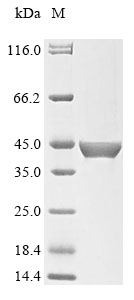The gene encoding the Human FSHR protein (18-366aa) is inserted into a plasmid vector to form the recombinant plasmid, which is introduced into baculovirus cells. baculovirus cells that have successfully taken up the recombinant plasmid can be selected based on their ability to survive in the presence of a specific antibiotic. The recombinant plasmid-containing baculovirus cells are cultured under conditions that promote the expression of the interested gene. The protein is fused with a N-terminal 6xHis tag. After expression, the recombinant Human FSHR protein is isolated and purified from the cell lysate through affinity purification. The resulting recombinant Human FSHR protein is resolved by denaturing SDS-PAGE, allowing its purity to be estimated, greater than 85%.






